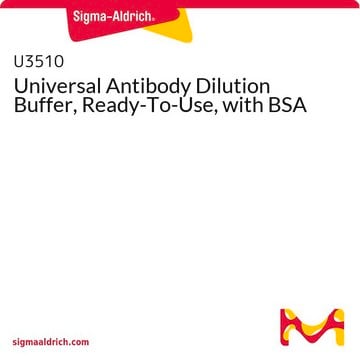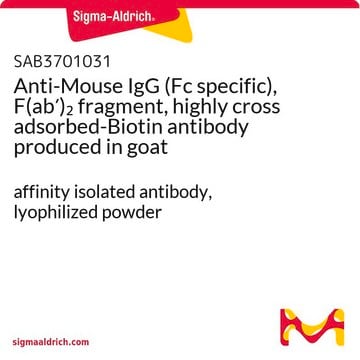B2064
Bovine Serum Albumin
heat shock fraction, Australia origin, protease free, low fatty acid, low IgG, pH 7, ≥98%
Synonym(s):
Bovine Serum Albumin, Albumin bovine serum, BSA, Bovine albumin
Sign Into View Organizational & Contract Pricing
All Photos(1)
About This Item
Recommended Products
Assay
≥98%
form
powder
mol wt
~66 kDa
purified by
heat shock fractionation
origin
Australia origin
Fatty acid content
<0.05%
impurities
≤0.05% IgG
pH
7
foreign activity
protease ≤0.05 U/mg
storage temp.
2-8°C
Looking for similar products? Visit Product Comparison Guide
General description
Bovine serum albumin (BSA) is made up of 583 amino acids, with no carbohydrates. It is a water-soluble protein with a molecular weight of 66.4kDa. Six α-helices form three homologous domains of BSA. Depending on pH, it undergoes reversible conformational isomerization. The native structure of BSA becomes reactive and flexible on heating. BSA acts as a model protein in various studies, such as immunodiagnostic procedures, cell culture media and clinical chemistry. It is also relevant in foods containing bovine milk or meat.
Appl- Bovine serum albumin has been used as a supplement of phosphate buffered saline (PBS) to store brain tissue sections. It has also been used as a blocking agent for cells for immunofluorescence analysis.
Appl- Bovine serum albumin has been used as a supplement of phosphate buffered saline (PBS) to store brain tissue sections. It has also been used as a blocking agent for cells for immunofluorescence analysis.
Biochem/physiol Actions
Certain conformational and primary-sequence epitopes of BSA are suspected allergens in human beef and milk allergies.
Features and Benefits
- Australia origin
- Fatty acid free / ultra-low fatty acid content (≤ 0.05%)
- Protease-free
- Low IgG content (≤ 0.05% IgG by Ouchterlony Titer)
Preparation Note
Serum albumin may be referred to as Fraction V. This naming convention is taken from the original Cohn method of fractionating serum proteins using cold ethanol precipitation. Serum albumin was found in the fifth ethanol fraction using Cohn′s method. Since then, the term "Fraction V" has been used by some to describe serum albumin regardless of the method of preparation. Others have used this term to describe serum albumin purified by ethanol fractionation methods that have been highly modified since the original Cohn method was described. Sigma-Aldrich manufactures and distributes serum albumins purified from a variety of primary methods including the true Cohn fractionation method, modified ethanol fractionation methods, heat shock and chromatography. Additional purification steps may include crystallization or charcoal filtration.
Storage Class Code
11 - Combustible Solids
WGK
WGK 3
Flash Point(F)
Not applicable
Flash Point(C)
Not applicable
Certificates of Analysis (COA)
Search for Certificates of Analysis (COA) by entering the products Lot/Batch Number. Lot and Batch Numbers can be found on a product’s label following the words ‘Lot’ or ‘Batch’.
Already Own This Product?
Find documentation for the products that you have recently purchased in the Document Library.
Customers Also Viewed
Hypoxia induces pulmonary arterial fibroblast proliferation, migration, differentiation and vascular remodeling via the PI3K/Akt/p70S6K signaling pathway.
Chai X, et al.
International Journal of Molecular Medicine, 41(5), 2461-2472 (2018)
Corrigendum: Formation and reshuffling of disulfide bonds in bovine serum albumin demonstrated using tandem mass spectrometry with collision-induced and electron-transfer dissociation.
Rombouts I,et.al.
Scientific Reports, 5, 15589-15589 (2015)
Effect of Linguizhugan decoction on neuroinflammation and expression disorder of the amyloid β-related transporters RAGE and LRP-1 in a rat model of Alzheimer's disease.
Hu Qianfeng, et al.
Molecular Medicine Reports, 17(1), 827-834 (2018)
Rapid confirmation and revision of the primary structure of bovine serum albumin by ESIMS and Frit-FAB LC/MS.
Hirayama K, et.al.
Biochemical and Biophysical Research Communications, 173(2), 639-646 (1990)
Kinetics of Thermal Denaturation and Aggregation of Bovine Serum Albumin.
Borzova VA, et.al.
PLoS ONE, 11(4), e0153495-e0153495 (2016)
Our team of scientists has experience in all areas of research including Life Science, Material Science, Chemical Synthesis, Chromatography, Analytical and many others.
Contact Technical Service




